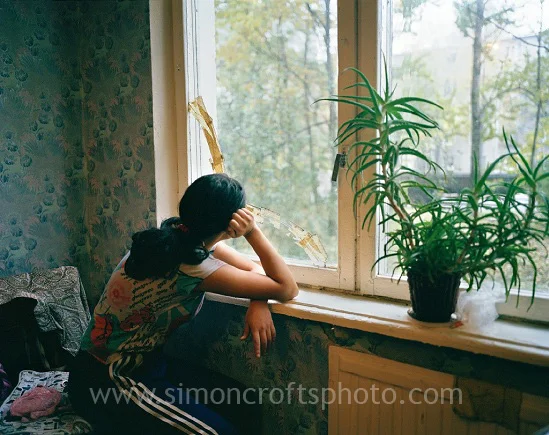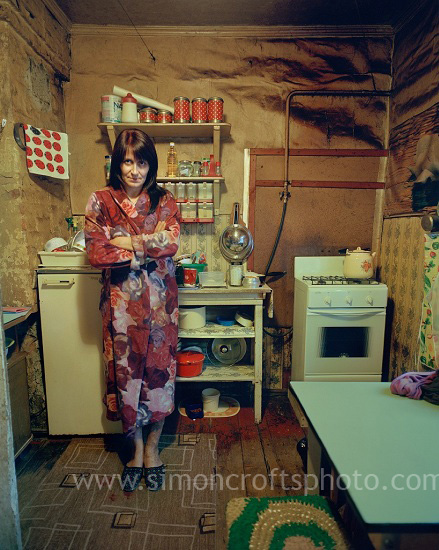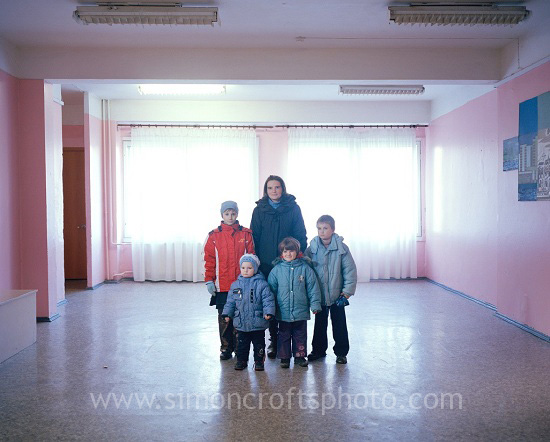Tanya in the Trust Room, Chernigiv AIDS Centre
Tanya has the unenviable job of letting people know the results of their HIV tests. This is the room where she tells them, called the 'Trust Room'. Because of discrimination against people with HIV, people lose their jobs, can be ostracised from society, and even lose access to social services such as healthcare if news of a positive status leaks - so the testing and the results have to be confidential. "Here in this Trust Room I conduct before and after testing consultations. Anyone who wants to can come here and be tested – either anonymously or in their own name...
The most important thing is to tell them what HIV infection is, the means of transmission and prevention. I recommend taking a test for HIV, as it is extremely important to know one’s status so as to take treatment at the early stages. Sometimes 15-20 people come every day. Some come also for post-test consultation.
It’s difficult when someone received a positive diagnosis. It’s difficult when a person realises that he/she is HIV positive and must fight it. The most important thing is to explain that life carries on. So that they don’t withdraw into themselves. To find a person who could give support.
It’s very difficult for yourself, you yourself live through it with that person. On the one hand, you feel sorry for them, on the other you try to make sure that they keep going. My first patient was a girl. Of course it was difficult. She was of my own age – young."
The story of an icon (HIV/AIDS in Ukraine)
Irina, Child Virologist, Kiev AIDS Centre. As Irina told the story, she was clearly distressed, and she cried. It felt like an intrusion to take her picture, I felt bad about it, but nevertheless I thought it was important to do so. To take the portrait was an intrusion, not to take the picture would be worse: "A little girl began to fall seriously ill when she was six, but nobody could understand why. Grandma and Grandpa were her guardians as the mother had died when the girl was 5 months old. They went round all the doctors, but since this was a well-off family, it didn’t occur to any of the doctors to test her for HIV. And in the end, when they tested her, she had lost 8 kilos over 5 months – they discovered that the virus had already developed into AIDS. The girl of course didn’t look her age at all, she was very thin. Thanks to the fact that she had such good grandparents she was still alive… When they came to us at the Centre, we began ARV therapy with her, but two months later she died. Before this, her grandfather… came and gave me this icon. The icon is the Virgin Mary, who looks over children."
"What upsets me? That is when people stigmatise our children. When they don’t want to take our children into nursery, or boarding school, it upsets me that the system of education is not ready, and that nobody knows when it will be ready. And how can you teach youth today when the country has an epidemic? Workers and teachers themselves don’t know about it. It upsets me when they don’t want to take children into nursery schools. It upsets me that medical staff themselves know little about HIV infection, and in places where preventative measures should be taken, they don’t take them…"
An unlikely angel
I'e been revisiting the images from "Time Out in Holiday Street", about the HIV/AIDS epidemic in Ukraine. When I took them, I wasn't running a blog and so only showed the images with short captions. But the words of the people I photographed (interviewed by the wonderful Oksana Shved - the dodgy translation however is all my fault) deserved to be quoted at much greater length. So I'm making up for lost time by letting them speak here. I will post several hopefully over the next few days. First is Volodya. Ever since I met Volodya, with his piercing eyes and bald pate he stuck in my head as my idea of what an angel might look like if one ever descended to Earth. He was running a needle exchange programme at Kiev AIDS Centre, on Holiday Street:
"People come here with problems and I try to help – many come with a ‘diagnosis’. People come in great distress. I don’t try to preach to them, instead I try to explain. Sometimes we sit for four hours. Also, many HIV+ people come, and I help them. When I’m ill, I feel bad, and when you are ill – you, you, you, and you - are in no way better than me, and in no way worse or better than him. And the problem is this: that this person was living, having fun in life, and then they tell him – you have AIDS… And he loses it – is completely lost in a moment.
And when I show them a whole pile of examples and people come and say “I too am HIV+ and I live like that and do this and I’m improving”. I had girls in here who came out giggling, and people asked me “what on earth were you doing to them?” I answer: “I slept with them!” It’s difficult to explain, that I talk to the person so much that he himself has already forgotten about HIV/AIDS. At least, I have softened the blow. Some take a year, others take months."
Holiday Street
"I’m a tactile, communicative person, and address everyone as an equal. Never as “you, my son”. I work as an equal among equals. I never say that you are bad because you are a drug addict and are HIV+, while I’m good because I’m not a drug addict and not HIV+... For me, all people are good.
When I see syringes lying around, they all have caps on the needles – that is a very great achievement. Not long ago we opened a drug den – all the syringes had caps on them. A drug addict who is “in the shit”, he doesn’t give a damn… and here they all are, in their caps! I was astonished. My eyes popped out of my head, and I realised, that there is a point to it all.
Earlier, when I began working in the provinces, syringes were lying around everywhere. You go into an entrance door, look in the post box… and can you imagine, a child sticks its hand in, or you try to pick up your newspaper and there… is blood, and hepatitis! And everything… you receive everything in the world."
More Peterburgers
The week I spent there with EveryChild gave me the opportunity to visit a number of families with a range of problems. I take my hat off to this lady, who was bringing up her three hyperactive sons single-handedly. They had suffered from serious health problems caused by an allergy, but were beginning to recover with some social support and once the source of the allergy was idenitified. The family was incredibly active, with boxes full of interesting items - a cat's skull, items of natural history collected in the countryside, collections of scientific interest. Music was a key part of their life. The mother deserved a medal for keeping the boys occupied. The eldest son will soon be starting to study art at Peterburg's world-renowned Hermitage.
Another family, another boy. He was very happy to pose with his toys - and the cat wanted some of the action too:
In Petersburg, like everywhere else the world over, family relations can be difficult sometimes:
I visited a hostel where children are able to stay whil their family are having problems - for example, while parents are in hospital and unable to care for the children. But some were there simply because they were able to get on with their parents.
A couple of the childrens' homes had been recently renovated.
And some homes hadn't seen renovation for a while.
This had nothing to do with the families I visited, except that it was near their building. But I liked this building. The legend on the side reads "Let's preserve the natural environment":-
Propiska in St Petersburg
I recently visited St. Petersburg, where I was working with EveryChild charity, taking pictures of St Peterburg families who have problems. EveryChild are doing some really fantastic work there, but it's a huge job. But what struck me most was how many social problems stem from the identity card and registration system (which used to be know as the 'propiska'). The Russian government use it as a way of controlling the population by stopping economic migrants moving to St Petersburg or Moscow where much of the big money is to be made. What it means is that there are two classes of society - those that have a Petersburg propiska, and those that don't. The latter are illegal immigrants in their own country, with no rights to social welfare, education, medical care or a job.
So many of Russia's problems stem from this old Soviet system of keeping control of the population by requiring registration and an internal passport - an identity card.















